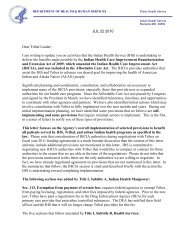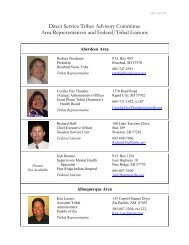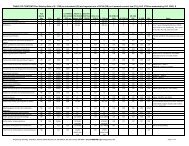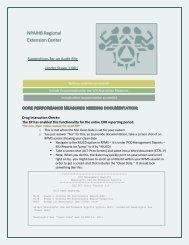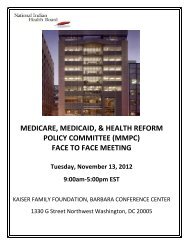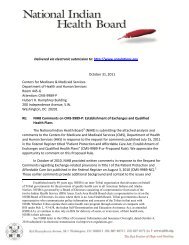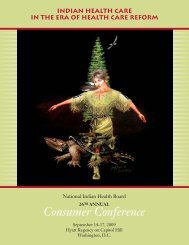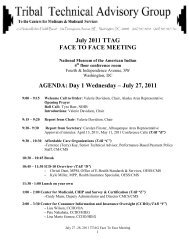âHealth Insurance Premium Tax Creditâ (IRS REG-131491-10)
âHealth Insurance Premium Tax Creditâ (IRS REG-131491-10)
âHealth Insurance Premium Tax Creditâ (IRS REG-131491-10)
- No tags were found...
You also want an ePaper? Increase the reach of your titles
YUMPU automatically turns print PDFs into web optimized ePapers that Google loves.
NIHB Supplemental Submission - Definition of Indian1402(d)(1) of the ACA waives cost-sharing for any individual whose family householdincome is below 300% of the Federal poverty level and who is ―enrolled in any qualifiedhealth plan in the individual market through an Exchange [and] is an Indian (as defined insection 4(d) of the Indian Self-Determination and Education Assistance Act (25 U.S.C.450b(d)).‖ And, the protection from tax penalties applies to individuals who are members ofIndian Tribes as defined in the IRC 45A. In the past, when Congress has cited to Indianspecificstatutes within more general legislation, courts have found clear congressional intentas to its scope when, for example, ―the incorporation of the ISDEAA was done with surgicalprecision.‖ 82 Confusing citation to three separate statutes that nevertheless say the exactsame thing hardly rises to this level of clarity, and therefore requires agency clarification.This statutory ambiguity will become amplified in the implementation of the singlestreamlined application for Exchange plans and Medicaid, 83 if clarifying regulations aboutwho is an ―Indian‖ are not adopted. Cost-sharing protections for Indians are alreadyavailable under Medicaid and the Children‘s Health <strong>Insurance</strong> Program (―CHIP‖). 84 Theyare available to Indians as defined at 42 C.F.R. § 447.50. It is impossible to imagine thatambiguity and confusion will not result if there is no definition of who is an ―Indian‖ for thepurposes of Exchange plan cost-sharing protections. And, even more, confusion will result ifit is unclear whether a person is an Indian for the purposes of special enrollment, but perhapsnot for Exchange plan cost-sharing or protection from tax penalties.In the preamble to the Exchange Establishment NPRM, CMS acknowledges thisproblem by requesting ―comment on how to distinguish between individuals eligible forassistance under the Affordable Care Act and those who are not in light of the differentdefinitions of ‗Indian‘ that apply for other Exchange provisions.‖ 85Comment is also requested on the proposal regarding proposed § 155.350 regardingthe best practices for accepting and verifying documentation related to Indian status. 86 Theproposed language in the Exchange Eligibility NPRM is that the applicant be able to attest tobeing an Indian, but that the Exchange must verify the attestation. 87 The proposed rule goeson to indicate that absent other approved sources for verification that the Exchange shouldrely on ―documentation provided by the applicant in accordance with the standards foracceptable documentation provided in section 1903(x)(3)(B)(v) of the Social Security Act,which allows for documents ―issued by a federally recognized Indian tribe evidencing8283Navajo Nation v. Dep’t of Health and Human Servs., 325 F.3d 1133, 1139-40 (9th Cir. 2003).The single streamlined application is required by ACA § 1413(b)(1)A) and proposed rule §155.405.8485See, ARRA § 5006.76 Fed. Reg. 41879 (regarding purchase of premiums under § 155.240(b)). It is important tonote that NIHB does not accept the premise that the three definitions relied upon in the ACA regardingExchanges are actually different from one another, although that appears to be the assumption made byHHS in the NPRMs. We addressed this issue comprehensively in Section 3 of this Analysis andComment.868776 Fed. Reg. 51223.Exchange Eligibility NPRM § 155.315(c).National Indian Health Board Page 19 of 24 October 31, 2011



